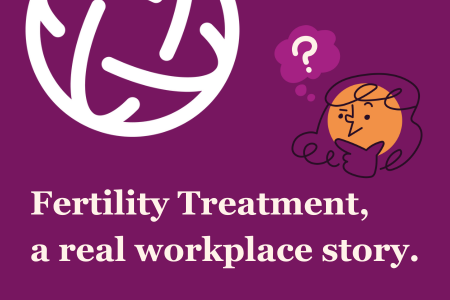In recent studies by Axa Health (in collaboration with the Centre of Economics and Business Research (CEBR), the neglected aspect of women’s health in the workplace has been unveiled, projecting an immense annual toll of £20 billion on the UK’s economy.
We recently wrote Part 1 of this important series which delved into the profound impact of the menopause on women in the workplace, shedding light on the need for comprehensive support. In Part 2, we now highlight another critical facet of women’s health at work: fertility treatment. Drawing from the poignant experience of Sarah Dixon, shared with the permission of Sarah and Fertility Network UK, we explore the nuanced challenges faced by individuals navigating fertility treatments while striving to maintain their professional lives.
Fertility treatments and Sarah’s story.
Fertility treatment is an arduous journey, often fraught with uncertainty and emotional strain. I’d like to share Sarah Dixon’s story to shed light on the silent struggles faced by many of those navigating fertility treatment within the workplace.
Sarah, a remarkable individual working at Fertility Network UK, had a vision of starting a family after getting married. However, life’s path diverged from her expectations. While those around her celebrated pregnancies and joyous gender reveals, Sarah found herself in a different, more complex emotional space.
Her initial fertility treatment was a private affair. Sarah chose not to disclose it to her employer, preferring to navigate it discreetly. This decision led her to use vacation days and bend work hours to attend crucial medical appointments. Yet, this makeshift arrangement took a toll, leaving her drained physically and emotionally. At times, she had to leave significant medical appointments prematurely to honour work commitments.
The pressures faced.
The pressures of fertility treatments are multifaceted – they involve financial strain, unpredictable health implications, and a rigorous schedule. When combined with the challenges of securing time off for appointments and the fear of disclosing personal struggles at work, the toll becomes overwhelming. A staggering 58% of individuals undergoing fertility treatments fear the professional repercussions of disclosing their situation. Shockingly, 19% have had to reduce their work hours or leave their jobs during treatment.
During her second attempt, Sarah confided in her line manager, who offered support but faced a lack of employer guidance. The absence of clear policies left her uncertain about her rights and communication protocols. Even with support, navigating work and fertility treatments remained a source of immense stress.
Eventually, Sarah made the difficult decision to resign and focus on her treatment. Her story, while personal, echoes a widespread issue. Infertility is not gender-specific and affects many across different walks of life. In the UK, 1 in 6 couples – a staggering 3.8 million people – experience fertility challenges. These individuals could be a part of your workforce, silently grappling with personal battles that might affect their productivity. These circumstances are not life long, they are temporary and with support the individuals could remain in your workforce and retain their skills and experience for a long time afterwards.
Forthcoming Legislation?
There are talks of potential legislation to safeguard the rights of those undergoing fertility treatments. However, until then, it’s crucial for workplaces to take proactive steps. This includes creating supportive policies, educating managers, fostering an open dialogue, and fostering a culture that encourages constructive discussions about fertility-related challenges.
Sarah’s journey, though uniquely hers, resonates with many others across the country. As we collectively strive for inclusive workplaces, it’s vital to create environments where employees can navigate fertility treatments without fear or undue stress, ensuring their well-being is prioritized.
How Gravitate can help.
At Gravitate HR, we’re committed to fostering inclusive, supportive workplaces that accommodate the diverse needs of employees. Whether you’re an employer seeking to implement comprehensive policies or an employee seeking guidance, we’re here to initiate the conversation and support you through every step. Reach out to us today for an initial conversation, and let’s pave the way for a more understanding and accommodating workplace environment.
For even more on this topic, we did run a Webinar previously which you can watch on our Videos page by clicking here.
